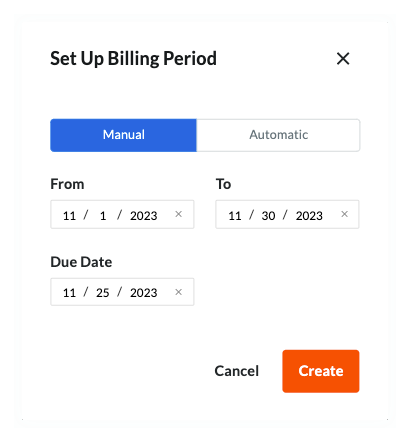Create Automatic Billing Periods in the Progress Billings Tool
- Last updated
- Save as PDF
For Procore Customers in the United States
 When your company applies the 'Owners English' or 'Specialty Contractors English' point-of-view dictionary, you'll see different tool names and term changes in the user interface. Learn how to apply the dictionary options.
When your company applies the 'Owners English' or 'Specialty Contractors English' point-of-view dictionary, you'll see different tool names and term changes in the user interface. Learn how to apply the dictionary options.
- To learn the differences: Show/Hide
-
This table shows the differences in tool names (bold) and terms across the point-of-view dictionaries for Project Financials. These dictionaries are available in US English only. The default dictionary is designed for general contractors, which means that you will need to work with your Procore Administrator at your company and your Procore point of contact to access the other dictionary options.
General Contractors
English (United States) - Default
Owners
English (Owner Terminology V2)
Specialty Contractors
English (Specialty Contractor Terminology)
Invoicing Invoicing Progress Billings Owner Funding Owner Owner/Client Owner/Client GC/Client Prime Contract Change Order Funding Change Order Client Contract Change Order Prime Contracts Funding Client Contracts Revenue Funding Revenue Subcontract Contract Subcontract Subcontractor Contractor Subcontractor Subcontractor Schedule of Values (SSOV) Contractor Schedule of Values (CSOV) Subcontractor Schedule of Values (SSOV)
-
Objective
To create automatic billing periods for a project's subcontractor invoices.
Background
A Billing Period defines the billing cycle used by a project's team and invoice contacts on Procore's invoices and progress billings. In addition to defining the frequency of the billing cycle (for example, monthly or weekly), a billing period also defines the billing cycle's start/end date and the due date for the invoice or progress billing.
Examples
Common billing periods include:
- Monthly
Examples of common monthly billing periods are below:- Starts on the 1st day of a month and ends on the 30th of the same month.
- Starts on the 15th of one month and ends on the 14th of the following month.
- Weekly
Examples of common weekly billing periods are below:- Starts on Sunday of this week and ends on Saturday of this week.
Things to Consider
- Required User Permissions
-
- When you create a new billing period Procore automatically sets:
- The new billing period's status to Open.
- The previous billing period's status to Closed.
- There can only be one (1) billing period in the Open status at any given time.
- You can only create billing periods in the Project level Invoicing tool.
- You cannot create or manage billing periods at the Company level.
- These Invoice Management features rely on billing periods:
- To create a new invoice, a Procore project must have one (1) Open billing period. See Create a Subcontractor Invoice.
- To compile subcontractor invoice backups, keep all previously invoiced billing periods in the 'Billing Periods' table in the Closed status. Compile Subcontractor Invoice Backups with the Invoicing Tool. Never delete a billing period after it's linked to an invoice. See Edit Billing Periods.
- To automatically complete amounts on owner invoices with data from other Procore tools, billing periods and dates on supported financial items must match the billing period dates on the invoice. See How does Procore automatically complete amounts on an upstream invoice?
- When you create a new billing period Procore automatically sets:
Prerequisites
Steps
- Navigate to the Project level Invoicing tool.
- Optional: Click the Billing Periods tab.
- Click Create Billing Period.

- In the 'Set Up Billing Period' prompt, the Manual tab is active by default.
Tip
Tired of setting new dates every time you create a manual billing period? An invoice administrator can configure default billing period dates to preset the dates in the From, To, and Due Date fields of the 'Set Up Billing Period' prompt. See Configure Settings: Invoicing. If you don't complete this configuration, no preset dates show. Instead, you will see: mm/dd/yyyy
- In the Manual tab, accept the default billing period date or choose another date to:
- From. Set the start date for the new billing period.
Note
When creating an invoice when this billing period is Open, the 'From' date automatically populates the 'Period Start' field on the new invoice. - To. Set the end date for the new billing period.
Note
When creating an invoice when this billing period is Open, the 'To' date automatically populates the 'Period End' field on the new invoice. - Due Date. Set the due date for new invoice submissions during the new billing period.
Notes
- When creating an invoice when this billing period is Open, the date in the 'Due Date' field populates the 'Period Start' field on the new invoice.
- Once the 'Due Date' passes for an Open billing period, be aware that:
- Invoice contacts can no longer create or submit an invoice. In addition, invoice contacts can only edit a subcontractor invoice if an invoice administrator places it into the Draft or Revise & Resubmit status.
- Only invoice administrators retain the ability to Create a Subcontractor Invoice.
- From. Set the start date for the new billing period.
- Click Create.
Procore creates the new billing period and sets its status to Open. Procore also automatically sets the previous billing period to Closed.

